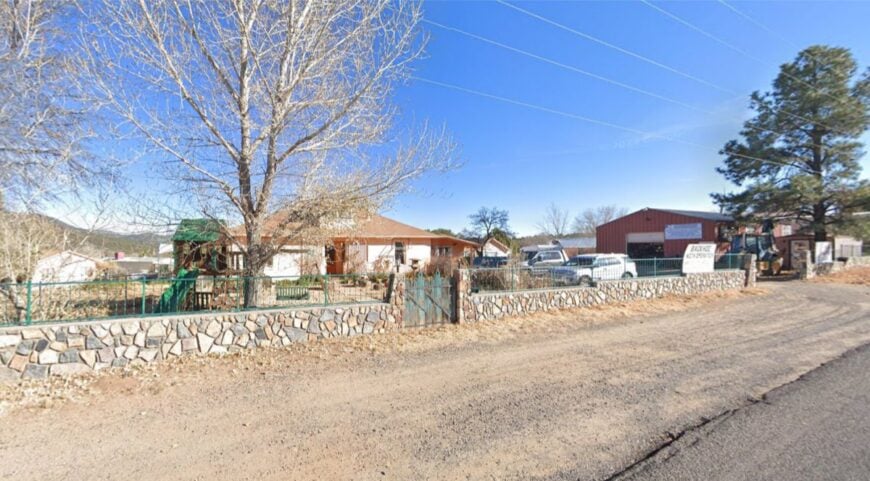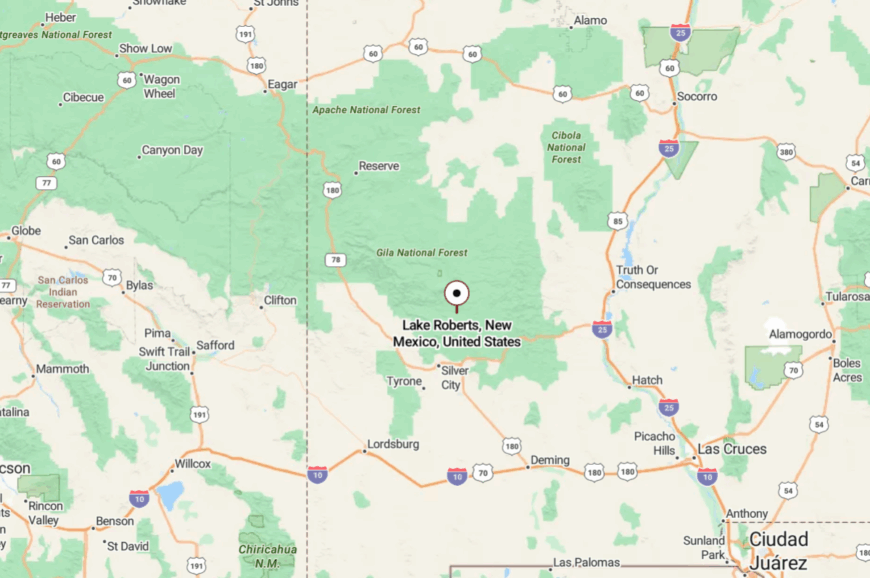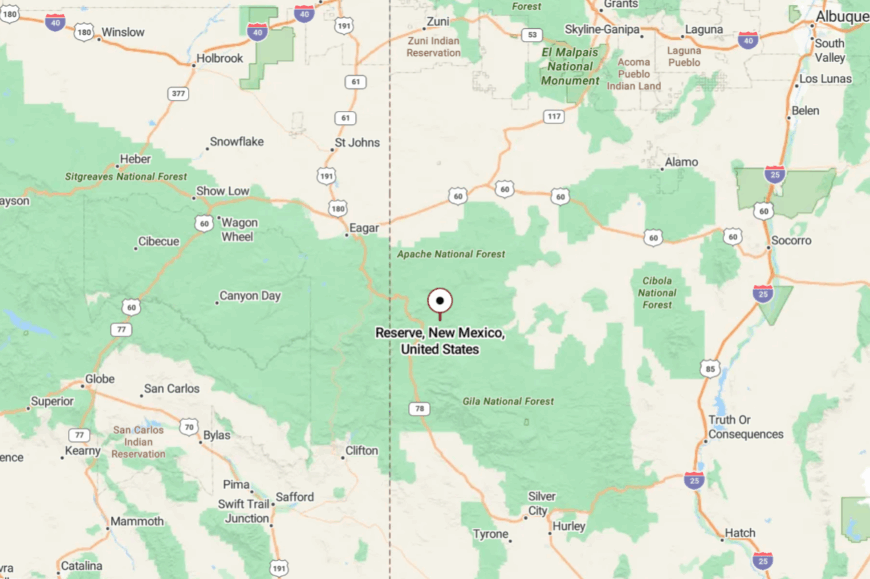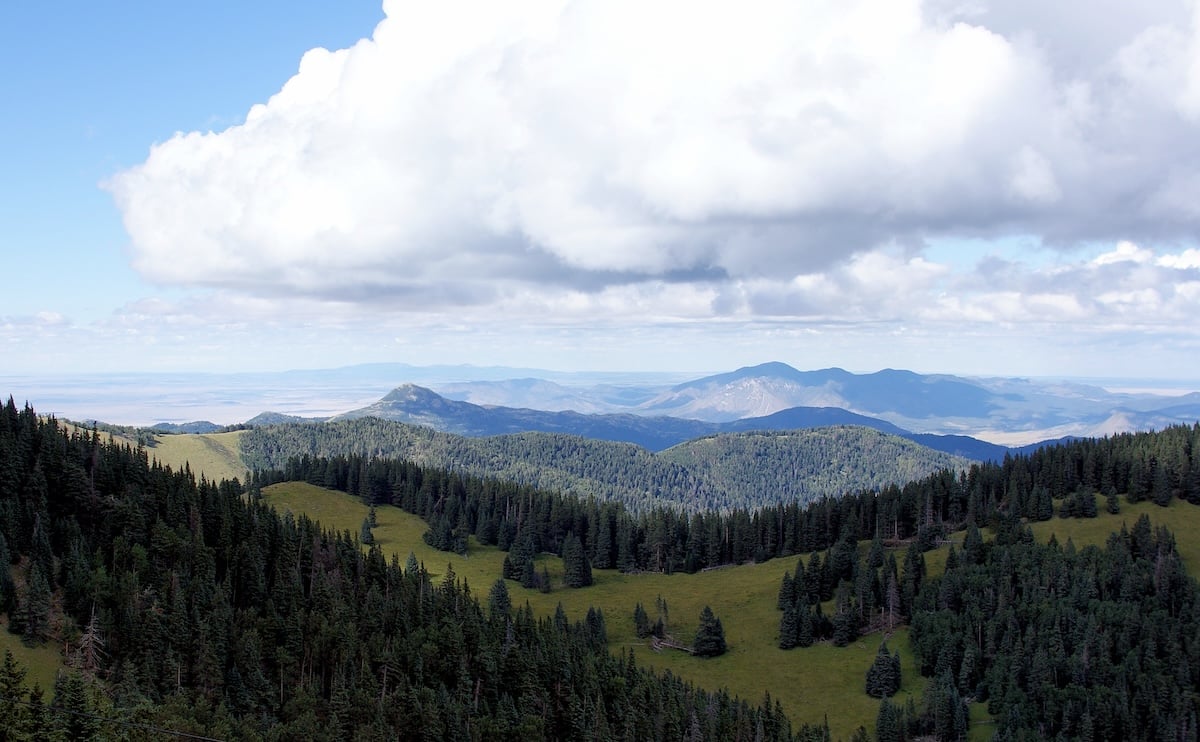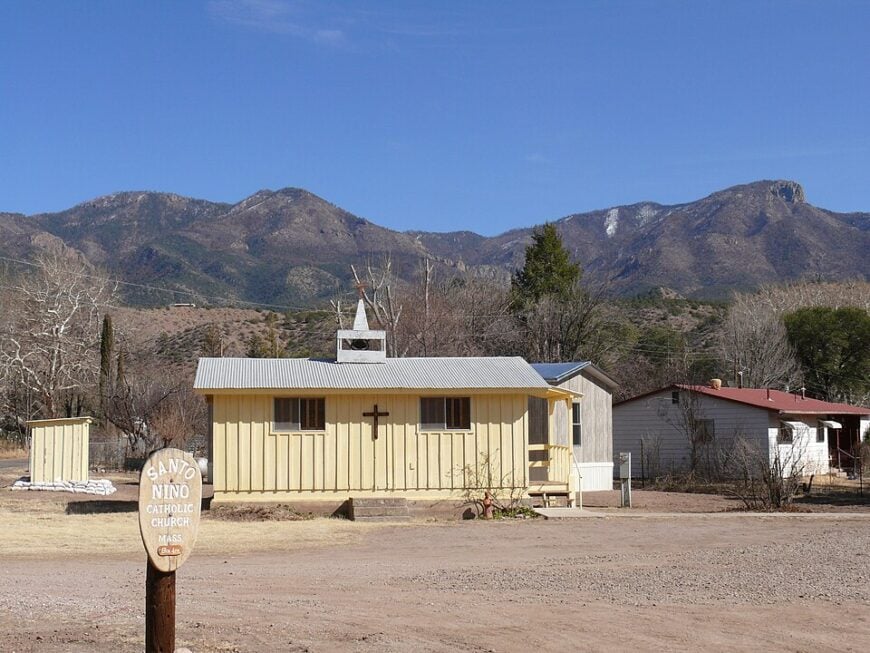
Would you like to save this?
Southwest New Mexico is the kind of landscape that teaches you patience. Distances stretch, horizons refuse to stay put, and silence often feels louder than sound. It’s a country of desert basins, river valleys, and mountain rims that catch light like a stage, each bend in the road promising more space than you thought possible.
What keeps people here isn’t convenience—there’s little of that—but the pull of land and sky. Ranchers, artists, and families hold on in places where post offices come and go, cell service falters, and neighbors are counted in minutes, not blocks. The reward is a rhythm that has less to do with clocks and more to do with seasons, weather, and the arc of the sun.
These towns carry stories in their bones: mining camps turned quiet streets, farming hamlets where alfalfa still scents the air, and crossroads that exist mostly because someone decided they should. They don’t compete for attention, and maybe that’s the point. Their seclusion is both shield and identity, a reminder that not every place has to be easy to find.
What follows is a count of 25 towns that hold to this slower frequency. Some are little more than names on a map, others still host cafés and schoolyards, but all share the same defining trait: they give you room to breathe. If you’re looking for tranquility wrapped in history, landscape, and sky, this corner of New Mexico has it in spades.
25. Animas – Big Sky at the End of the Valley
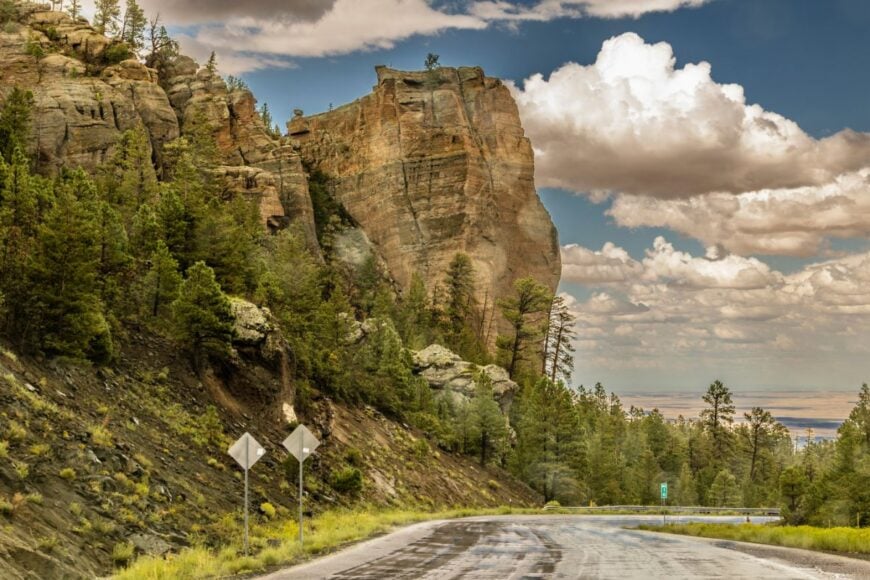
Animas sits in a wide, lonely valley where the horizon feels a size larger and the days move by the sun instead of a schedule. Its seclusion comes from distance—long miles to the nearest city, few services, and a borderland of ranches stitched to desert grass.
The vibe is spare and quietly confident: wind-ticked cottonwoods, feed stores, and pickup trucks dusted with road. Ride gravel backroads to watch pronghorn drift across fencelines, scan the Peloncillo and Animas Mountains for raptors, or wander old irrigation ditches where red-winged blackbirds chatter.
The work here is ranching, and the kinds of trades that don’t mind heat and silence. Nights arrive with starfields so thick they look poured from a bucket. It’s the kind of place that reminds you how big the West still is.
Where is Animas?
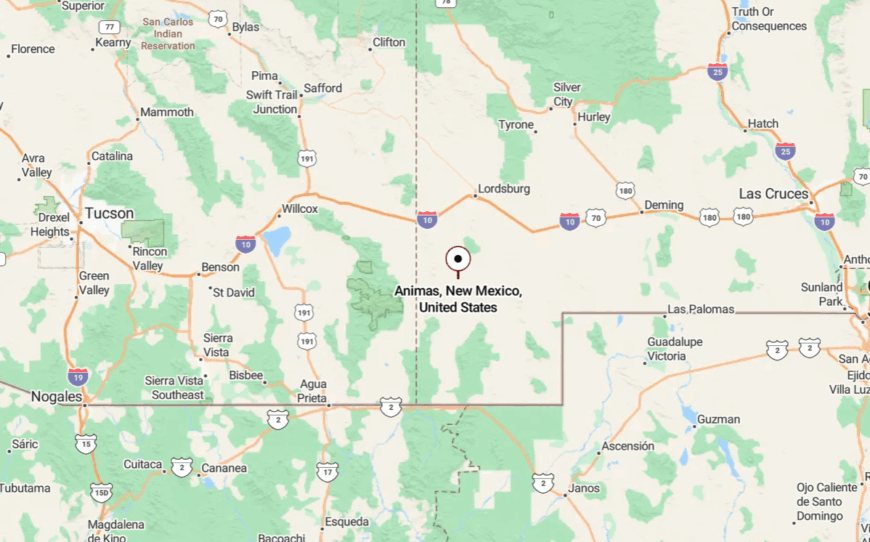
Tucked in far southwestern New Mexico, Animas sits in Hidalgo County, roughly 35 miles south of I-10 at Lordsburg. You reach it by following long, two-lane ribbons through open basin-and-range country.
The border with Arizona is close, and Mexico isn’t far, but everything still feels remote. By the time you arrive, the sky has already slowed you down.
24. Playas – Desert Grid and Empty Streets

Playas feels like a mirage of streets and right angles set out in the open desert, quiet as if waiting for a cue. Its seclusion is structural: a former company town turned near-empty grid, far from highways and tucked against low mountains.
The vibe is eerie and cinematic—neat curbs, wind rattling chain-link, and distant freight trains drawing their own horizon. Wander the edges where jackrabbits flash white tails, explore nearby slopes for agate, or drive to wide viewpoints where thunderheads muscle in from Mexico.
Work these days is minimal and intermittent, tied to training uses and the surrounding ranch country. Sunset paints the sidewalks pink and empty, a mood you can hear. It’s solitude with street numbers.
Where is Playas?
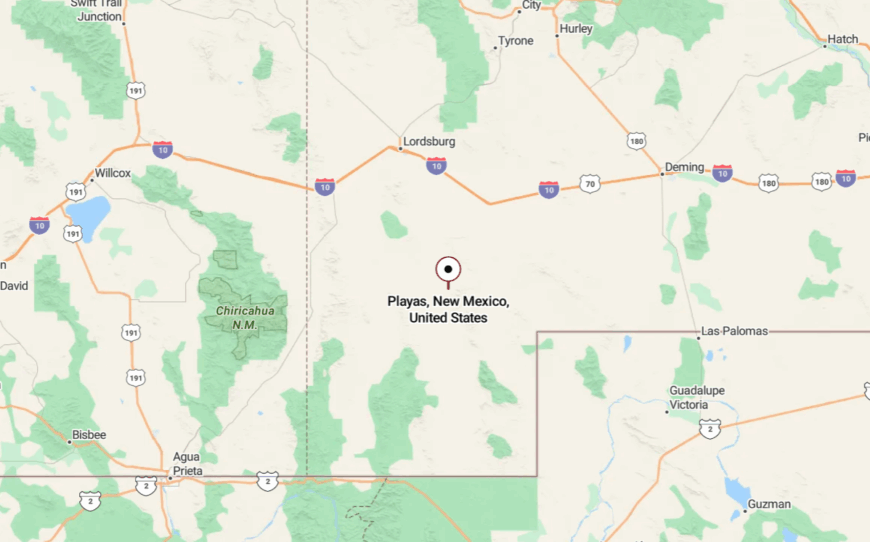
Set in southern Hidalgo County, Playas sits about 60 miles southwest of Deming. Most visitors peel off from State Highway 9 onto smaller roads that seem to forget traffic.
The route crosses open bajadas and grasslands with little to block the wind. It’s close to the border—and far from everything else.
23. Cotton City – Fencelines and Far Vistas
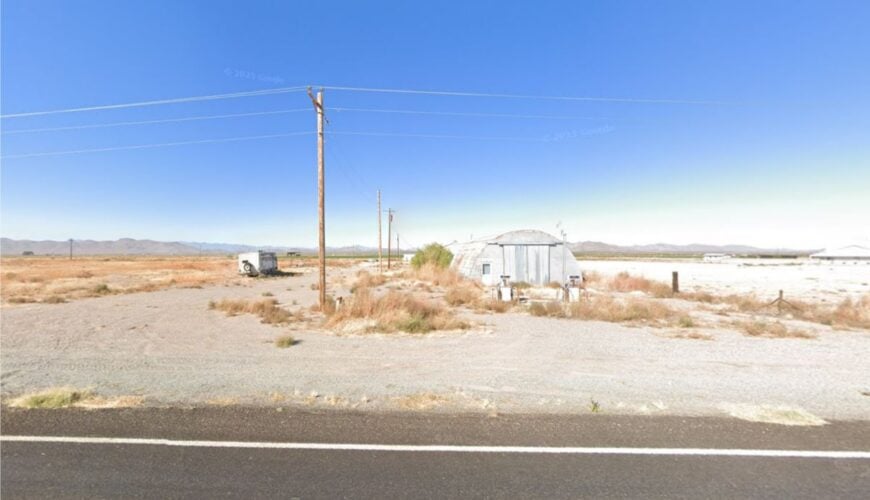
Cotton City is more crossroads than town, a handful of buildings shouldering fields that run until they blur. Seclusion stems from scale: huge acreage, light population, and distances that turn errands into excursions.
The vibe is utilitarian and dust-soft—irrigation wheels ticking, old tractors sunning by fence posts, and swallows stitching the eaves. Watch hawks hover over the fields, drive out to dry playas after summer storms, or picnic where the mountains step down to the flats.
Agriculture anchors life here, with seasons measured by water and yield. When evening drops, you can hear irrigation water talking to the earth. It’s simplicity that feels like a luxury.
Where is Cotton City?
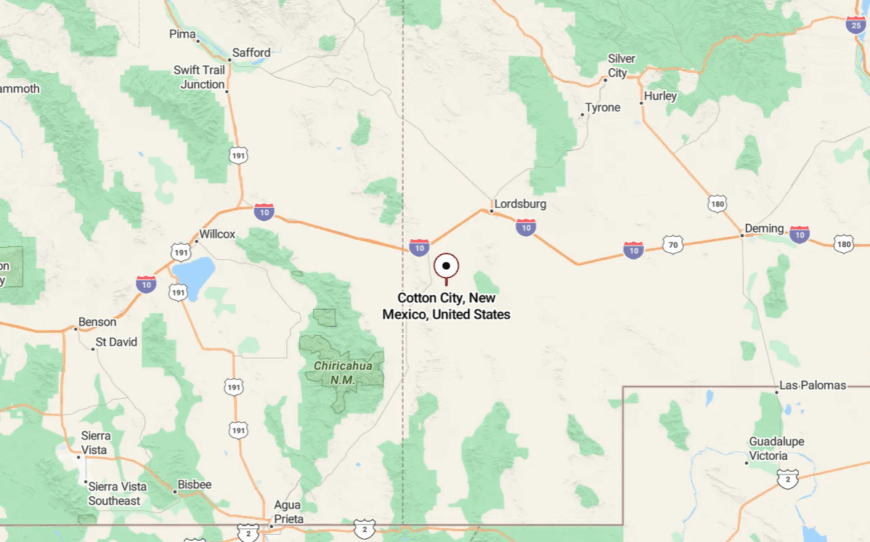
Would you like to save this?
In the southern bootheel of Hidalgo County, Cotton City lies roughly 25 miles south of Animas and well off the interstate grid. You reach it on long, straight county roads that pass more cattle than cars.
The Big Hatchet Mountains sit to the east like a weather gauge. Out here, even the map looks quiet.
22. Virden – River Bend on the State Line
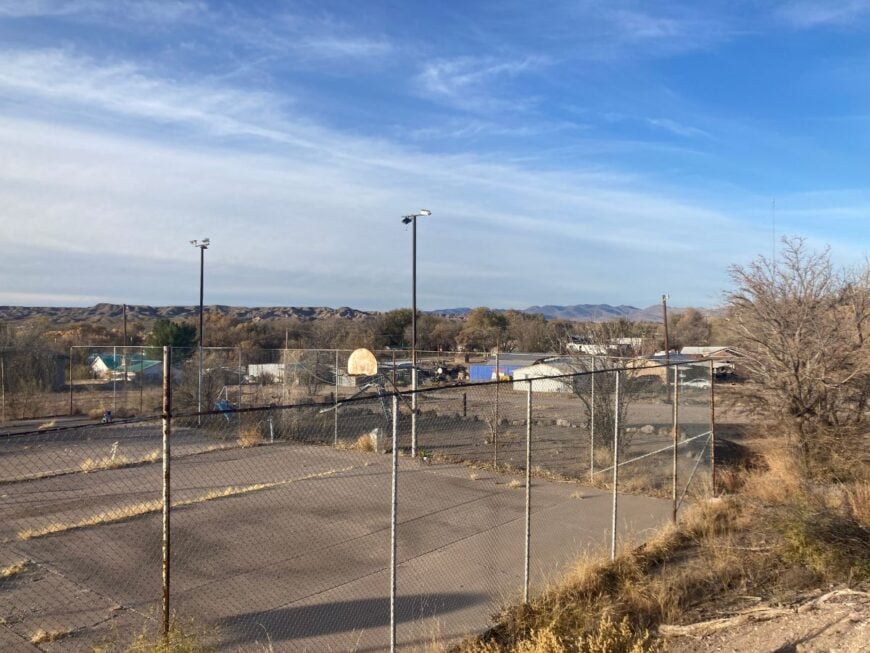
Virden curls along a green bend of the Gila River right against the Arizona line, small enough to count neighbors on one hand. Its seclusion comes from being tucked beneath levees and fields, far from tourist loops and quick detours.
The vibe is gentle and river-sweet—orchards, backyards with swing sets, and evenings that smell like alfalfa. Walk the levee at golden hour, fish the slow water under cottonwoods, or take a slow drive to see old farmsteads and churchyards.
Farming and family keep the gears turning. The river talks in low tones here, and the days follow suit. It’s a pocket of green in a world of gold.
Where is Virden?
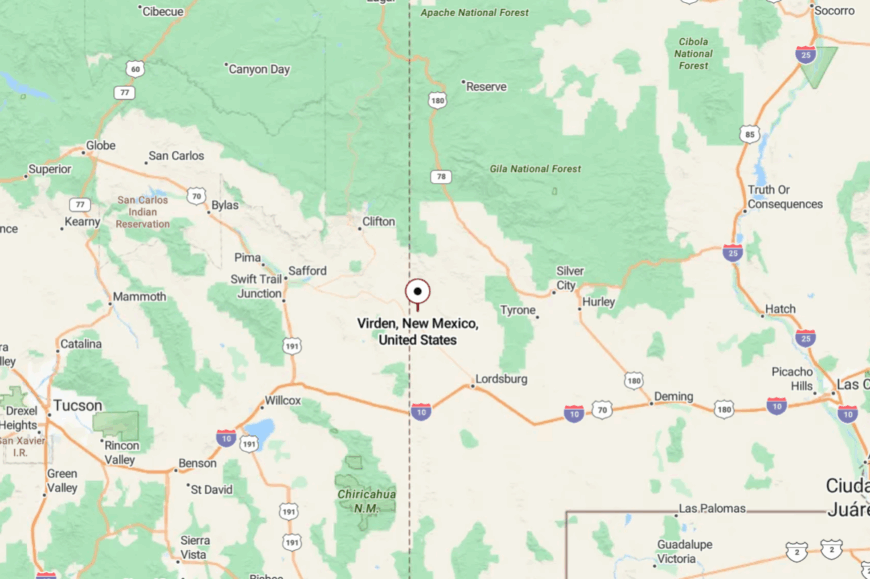
Perched in northwest Hidalgo County on the Gila River, Virden sits about 40 miles west of Lordsburg. You come in on state and county roads that trade speed for scenery.
Arizona lies just across the bridge, but it still feels out of the way. The river makes a small world feel complete.
21. Redrock – Cliffs, River, and Empty Road
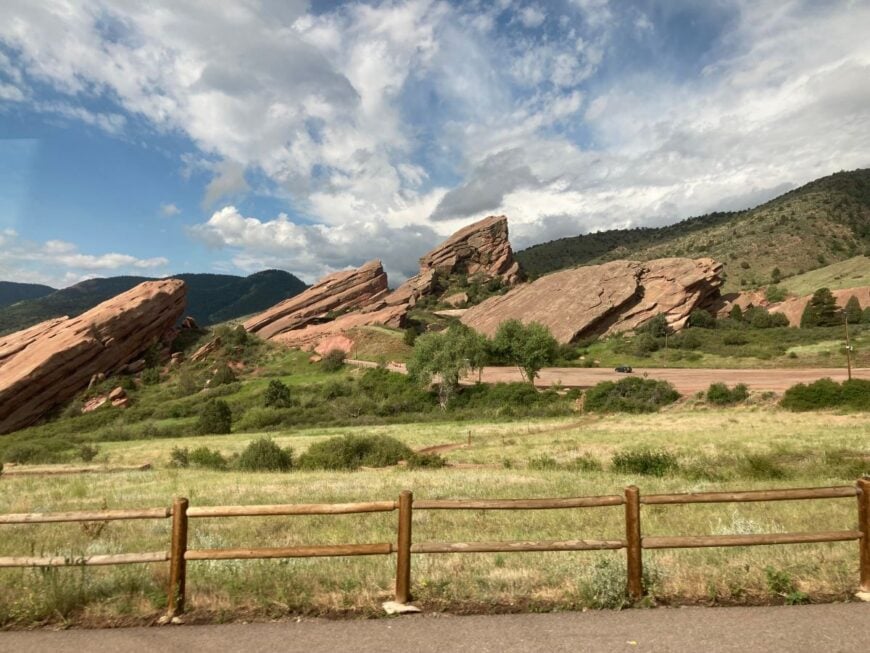
Redrock is a scatter of homes clinging to red cliffs above the Gila, where the highway narrows and conversation drops to a murmur. Its seclusion is the kind you feel in your shoulders—few neighbors, big country, and a gorge that keeps the world at a distance.
The vibe is raw and beautiful: canyon walls glowing at dusk, turkey vultures riding thermals, and quiet porches facing the water. Hike game trails along the benches, watch bighorn on the cliffs, or float a lazy stretch of the river when it’s right.
Life is part land-based work, part self-reliance. At night, the canyon holds the stars like a bowl. It’s the hush that stays with you.
Where is Redrock?

In northern Grant County, Redrock lies along the Gila River roughly halfway between Buckhorn and Virden. You reach it by winding two-lane through tight bends and sudden views.
Services are scarce, scenery is not. It feels like a deliberate detour from everything hurried.
20. Faywood – Hot Springs and Quiet Mesas

Faywood is a blip of cottonwoods and steam, famous for hot springs and otherwise content to keep to itself. Its seclusion comes from being tucked off the highway among low mesas and old ranchland.
The vibe is relaxed and mineral-sweet—steam drifting over bathhouses, ravens gossiping from power poles, and sun the color of honey. Soak in quiet pools, explore nearby sculpted rocks at the state park, or wander dirt roads where meadowlarks scatter ahead of you.
Tourism mingles with ranching in a low-key way. Even the wind seems to whisper here instead of shout. It’s a pause button you can step into.
Where is Faywood?
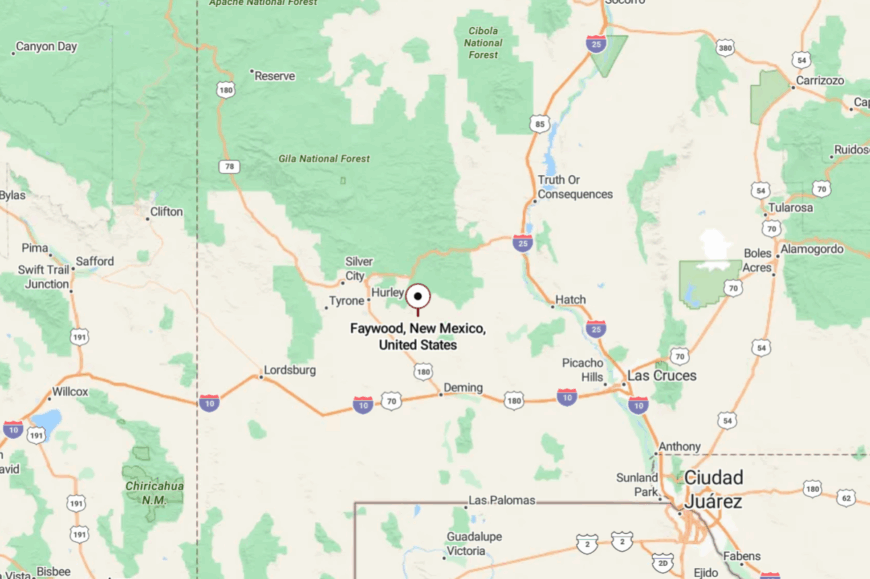
In central Grant County, south of Silver City, Faywood sits about 20 miles off US-180. Access is by a calm two-lane that slides between volcanic plugs and pasture.
The nearest towns are small and spread out, adding to the hush. You’ll know you’re close when the air smells faintly like rain on stone.
19. San Lorenzo – Green Pocket in a Wild Valley

San Lorenzo gathers beneath cottonwoods in the Mimbres Valley, a green seam stitched into miles of forested ridges. Seclusion comes from geography—narrow valley floors, looping roads, and mountains that close the door behind you.
The vibe is neighborly and arts-curious: roadside produce in summer, hand-painted signs, and porch guitars at dusk. Visit small chapels, bird along the river, hike the nearby foothills, or wander up-valley to quiet campgrounds under ponderosa.
Many folks split time between crafts, gardening, and service work in the valley. The light here falls softer, like it knows it’s welcome. It’s a place that meets you halfway and then slows you the rest.
Where is San Lorenzo?
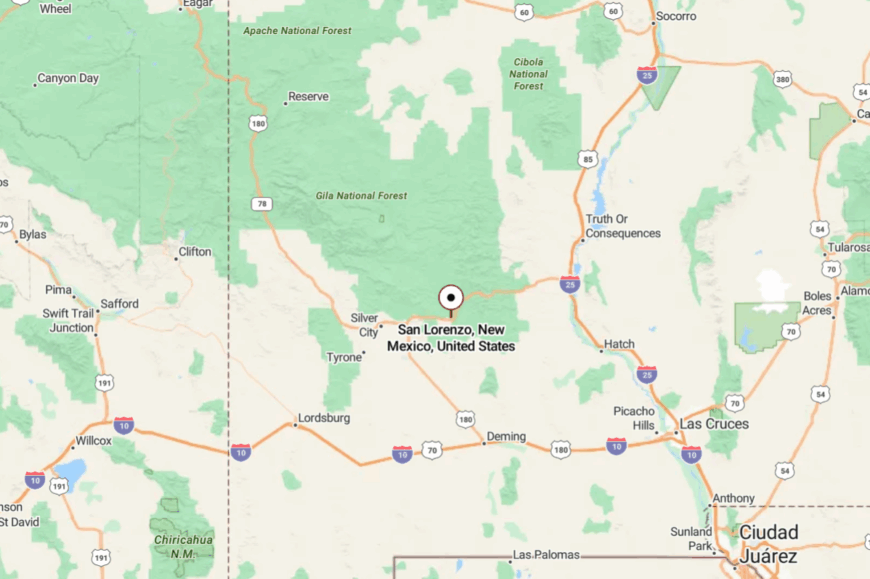
In eastern Grant County, San Lorenzo sits along NM-35 about 30 miles northeast of Silver City. The road winds through a ribbon of farms and fields before climbing toward lakes and trailheads.
There’s no fast way in, just pretty ones. By the last turn, the mountains feel like a gate.
18. Pinos Altos – Pines, Porches, and Old Gold
Pinos Altos perches in the pines just high enough to trade desert glare for filtered light and resin on the breeze. Its seclusion is a short distance and a long feeling—mere miles from town, yet the world falls away to forest.
The vibe is historic and a little theatrical: old false fronts, creaking porches, and weekend music spilling from a saloon. Poke around tiny museums, hike the Continental Divide Trail spurs, watch deer ghost between cabins, or linger over pie where locals swap trail gossip.
Tourism and arts mingle with retirees and forest work. When evening cool arrives, the trees start to talk. It’s a small stage with a big soul.
Where is Pinos Altos?
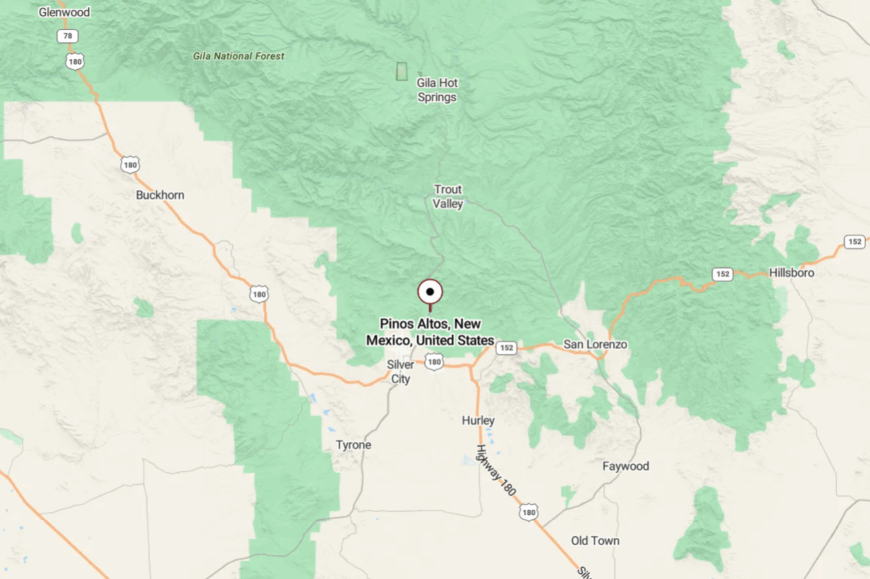
North of Silver City in Grant County, Pinos Altos sits along NM-15 at about 7,000 feet. You reach it by a curvy climb that trades speed for switchbacks and views.
The forest thickens quickly, and cell service thins. It’s close to town, far in feeling.
17. Lake Roberts – Water in a Land of Stone
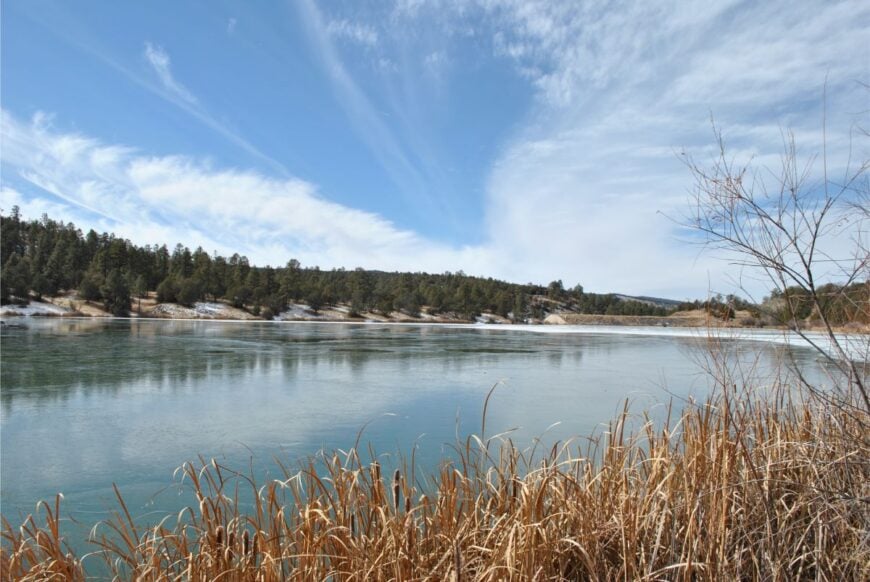
Lake Roberts is a pocket of blue in a world of ochre, a lakeside hamlet threaded with piñon smoke and trail dust. Seclusion comes from altitude and curves: the road is winding, winter can be real, and summer evenings are quiet as moths.
The vibe is camp-cozy—screen doors, canoe racks, and dogs asleep on cabin decks. Fish for trout at first light, hike to see ancient rock art nearby, watch hummingbirds mob a feeder, or drive a little further to higher trailheads on cool ridges.
Outfitters, small lodges, and seasonal work keep the lights on. When loons or owls call, it’s the only headline. It’s a place that teaches you to move at lake speed.
Where is Lake Roberts?
In the upper Mimbres Valley of Grant County, Lake Roberts lies along NM-35, about an hour northeast of Silver City. The road rolls through forest and meadow, with sudden windows to high country.
Services are few and pleasant; distances are measured in curves. By arrival, your shoulders have dropped an inch.
16. Mogollon – Ghost Town with a Beating Heart
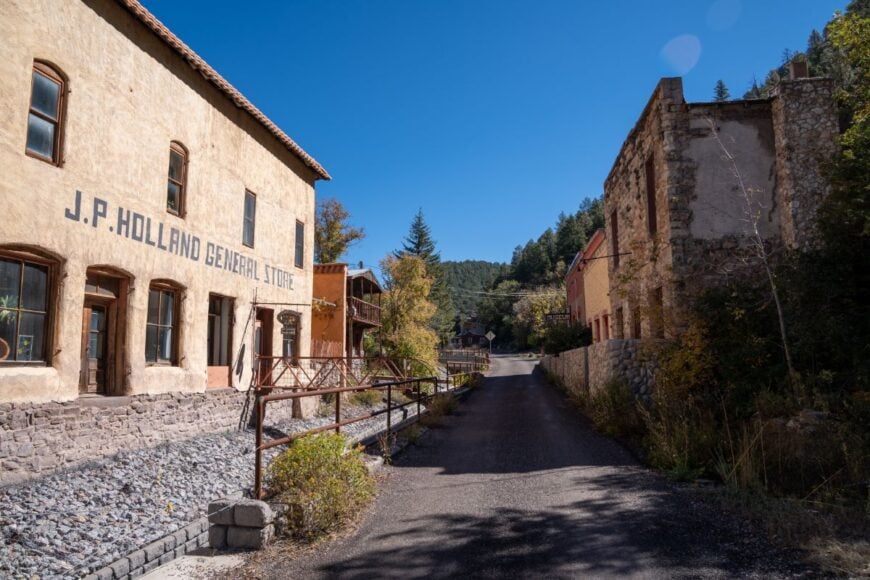
Would you like to save this?
Mogollon clings to a narrow, shadowed canyon, its weathered storefronts and stair-stepped porches poised above a seasonal creek. Seclusion is guaranteed by the road—steep, tight, and spectacular—and by winters that trim visitor numbers to a whisper.
The vibe is ghost-town romantic: clapboard grays, tin roofs, and stories that arrive on the wind. Browse tiny galleries, walk the old cemetery on the hill, hike into the aspen higher up, or simply listen to the creek water stitch the canyon together.
Tourism and restoration efforts keep a gentle pulse; otherwise, the place keeps its own counsel. Late light gilds the boards like old coins. It’s nostalgia made tangible.
Where is Mogollon?
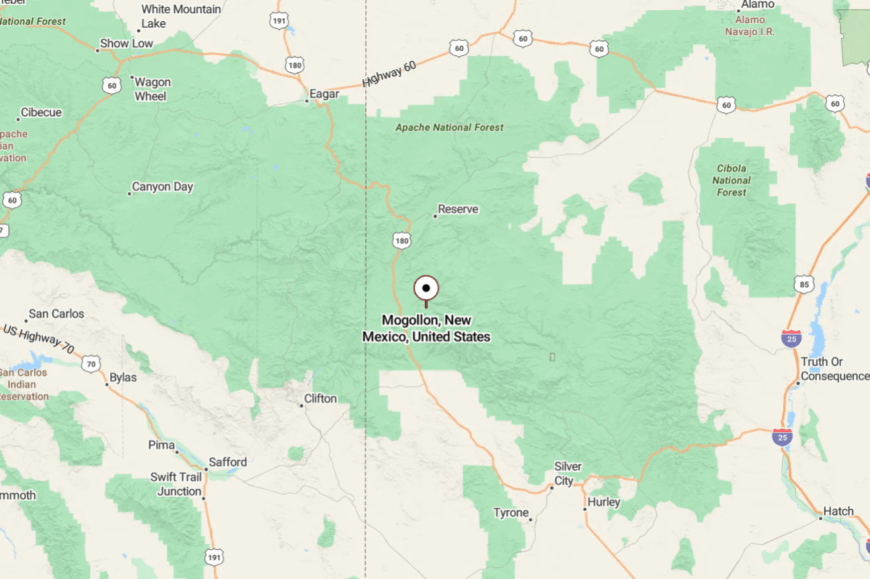
High in the Mogollon Mountains of Catron County, the town is about 9 miles northeast of Glenwood up a winding canyon road. Access is by narrow, slow-going pavement that feels like an invitation and a challenge.
The nearest services are well down the hill. Once you’re here, leaving feels optional.
15. Alma – River Flats and Rimrock
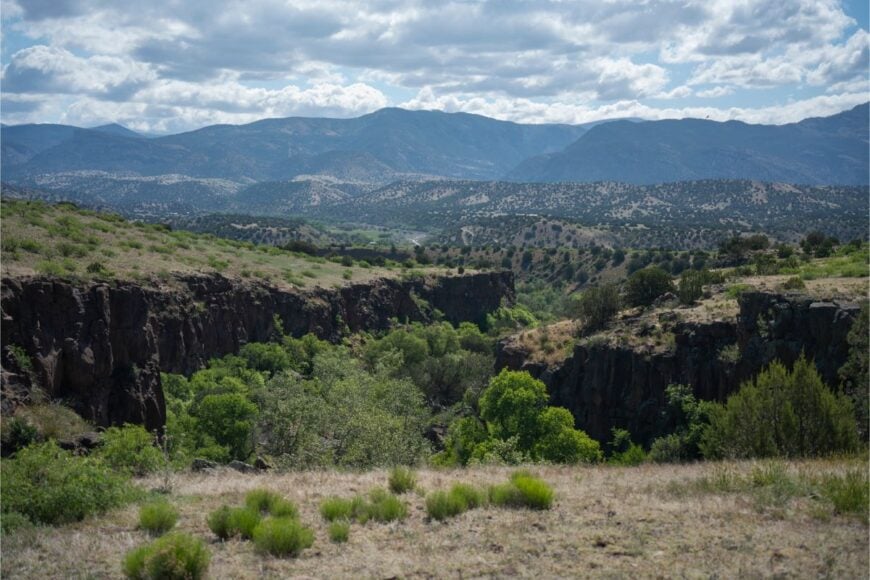
Alma spreads lightly along the San Francisco River, framed by rimrock and silvered cottonwoods. Its seclusion is part canyon, part distance—few reasons to pass through unless you mean to.
The vibe is ranch-quiet and bird-rich: horses flicking tails in pasture, kestrels on fence posts, and a store that remembers your name. Walk the river in morning shade, drive out to look for javelina sign, or point your camera at thunderheads stacking over the Mogollons.
Work is ranching, outfitting, and the kinds of tasks that fit between seasons. By dark, the river sounds like a lullaby you almost remember. It’s a soft landing in a big country.
Where is Alma?
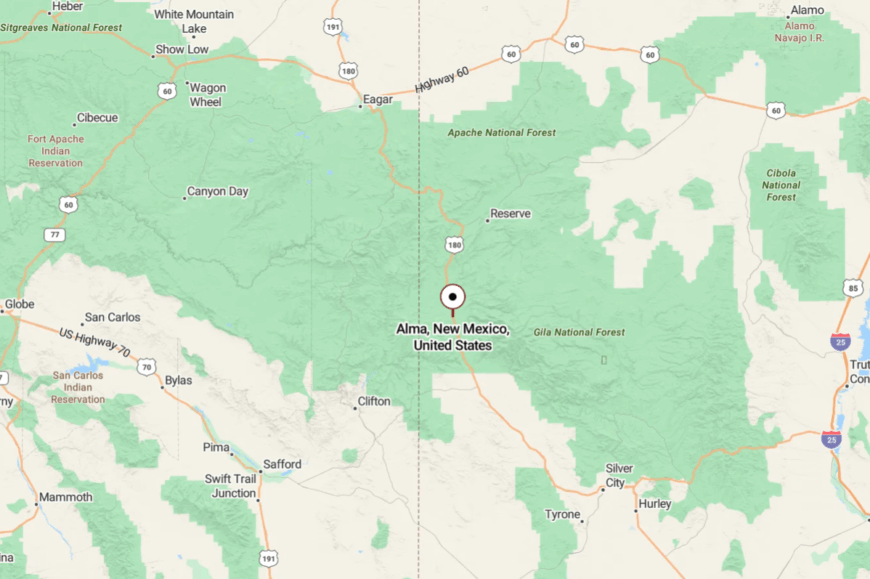
Just north of Glenwood in Catron County, Alma sits on US-180 along the San Francisco River. You get there on a two-lane that traces water and cliff.
Distances are simple; the landscape is not. It feels like the first page of a long story.
14. Reserve – Little Capital of the Quiet
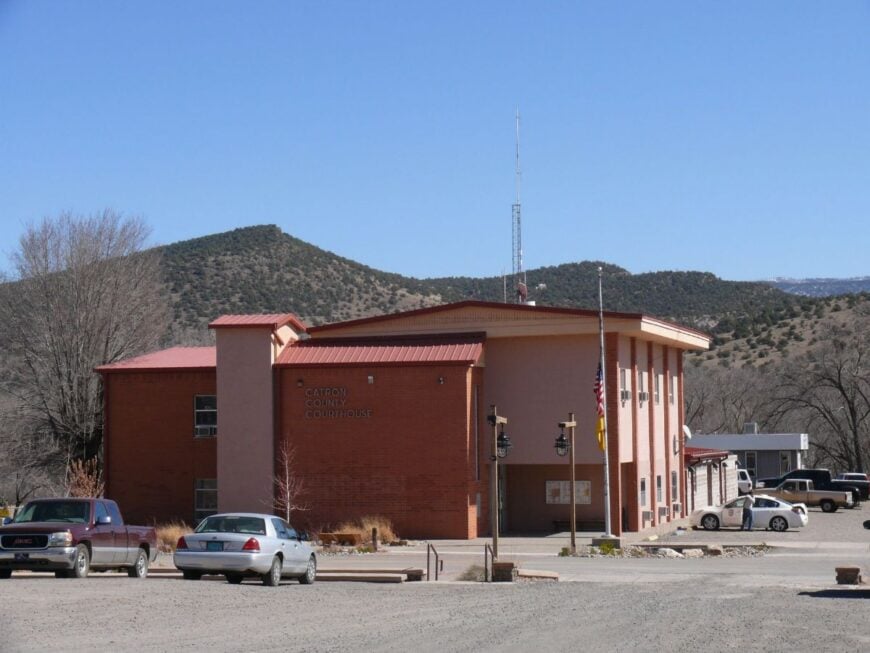
Reserve is the seat of a county bigger than some states’ counties, yet it keeps an easy, porch-swing pace. Seclusion lives in the surrounding national forest and the slow wheel of the seasons.
The vibe is small-town steady—school ballgames, café breakfasts, and the light clink of coffee cups meeting saucers. Hike pine-sweet ridges, glass for elk at dawn, visit the local museum, or linger over green-chile stew while thunder parades across the mountains.
Government, ranching, and logging do the heavy lifting. At night, the streets empty to crickets and the odd pickup. It’s a headquarters for disappearing into the hills.
Where is Reserve?
In western Catron County, Reserve sits at the junction of US-180 and NM-12, roughly 75 miles north of Silver City.
Approaches are all two-lane, all beautiful, and mostly empty. Forest rises in layered bands on every side. It’s close enough to stock up, far enough to exhale.
13. Apache Creek – Meadow, Chapel, and Quiet Roads
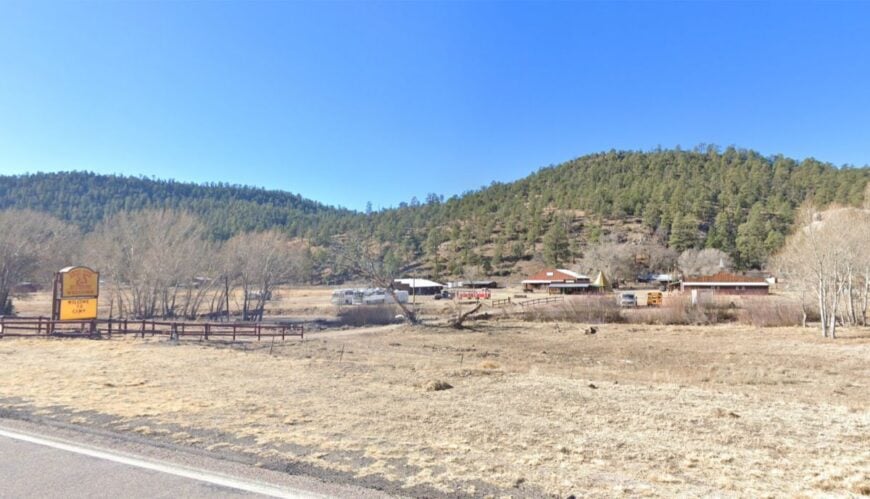
Apache Creek gathers where meadows meet timber, a modest cluster of homes and a chapel with views that calm the pulse. Seclusion is a function of smallness and distance: few neighbors, long forest edges, and dark nights.
The vibe is contemplative and rural—hand-cut firewood, horses nosing fences, and stars you can walk by. Picnic under tall pines, look for petroglyphs on nearby bluffs, or follow NM-12 just for the sake of a pretty drive.
Work here is ranch-adjacent or retired; time keeps an unhurried beat. Dusk feels like a blessing. It’s the quiet you always thought you’d find.
Where is Apache Creek?
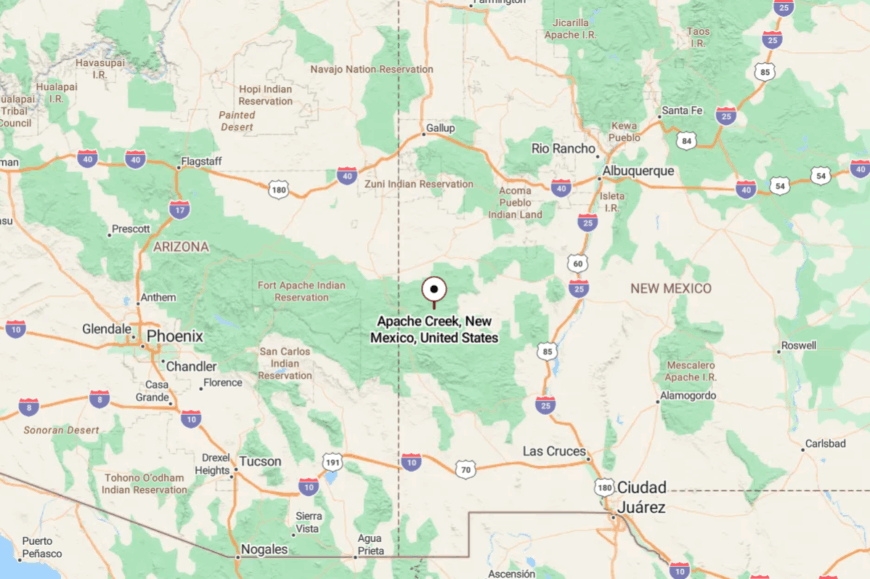
In central Catron County, Apache Creek lies along NM-12 between Reserve and Aragon. The road meanders through open range and timbered hills.
Traffic is so light you can count vehicles on one hand. It’s a dot on the map with a lot of sky.
12. Winston – Silver Echoes and Broad Horizons
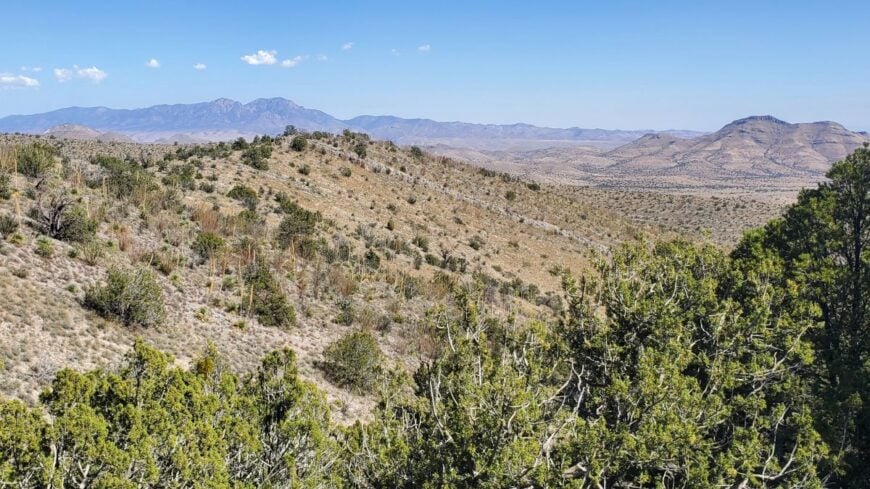
Winston stands plain and proud on the open flats north of the Black Range, a main street that wears its mining past without fuss. Seclusion comes from long miles of two-lane and a sense that the mountains turned their backs to shield it.
The vibe is spare, friendly, and sun-bleached: tidy false fronts, flags in the breeze, and dogs napping under pickups. Explore the old schoolhouse museum, cruise dirt roads toward elk country, or day-trip to canyons where sycamores lean over water.
Ranching and a trickle of heritage tourism keep the lights on. Even the wind seems to pass through quietly. It’s a good place to remember simple things.
Where is Winston?
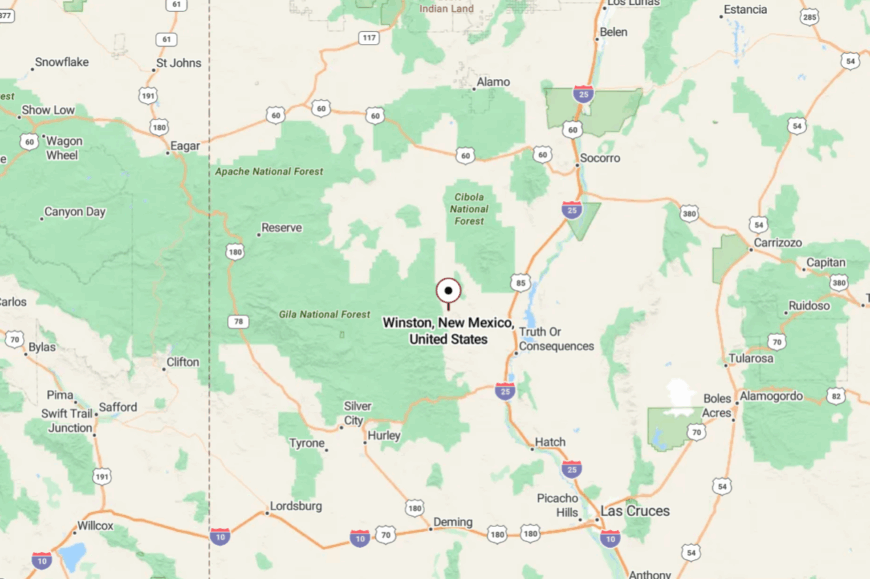
In northern Sierra County, Winston sits about 36 miles northwest of Truth or Consequences via NM-52 and NM-181. The drive glides from desert to open range before the mountains lift to the west.
Services thin with every mile. By the time you arrive, the sky has grown very large.
11. Chloride – Ghost Streets Under Cottonwoods
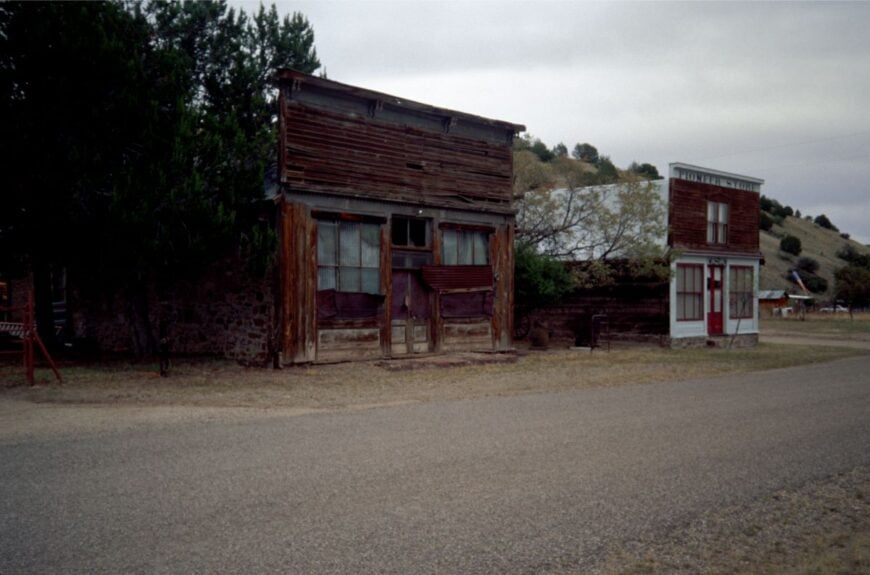
Chloride crouches at the mouth of a mountain canyon, a restored ghost town shaded by big cottonwoods and the memory of silver. Its seclusion is canyon-made: one good road in, stone walls on both sides, and winter nights that hold their cold.
The vibe is lovingly preserved—false fronts, museum rooms, and porches that creak in the afternoon heat. Tour the historic store and cabins, wander the cemetery on the hillside, hike into the canyon where sycamores reach for light, or poke around for old tailings in the brush.
A handful of residents and caretakers tend the past like a garden. When evening falls, the town feels like a sepia photograph come to life. It’s history slowed to a human heartbeat.
Where is Chloride?
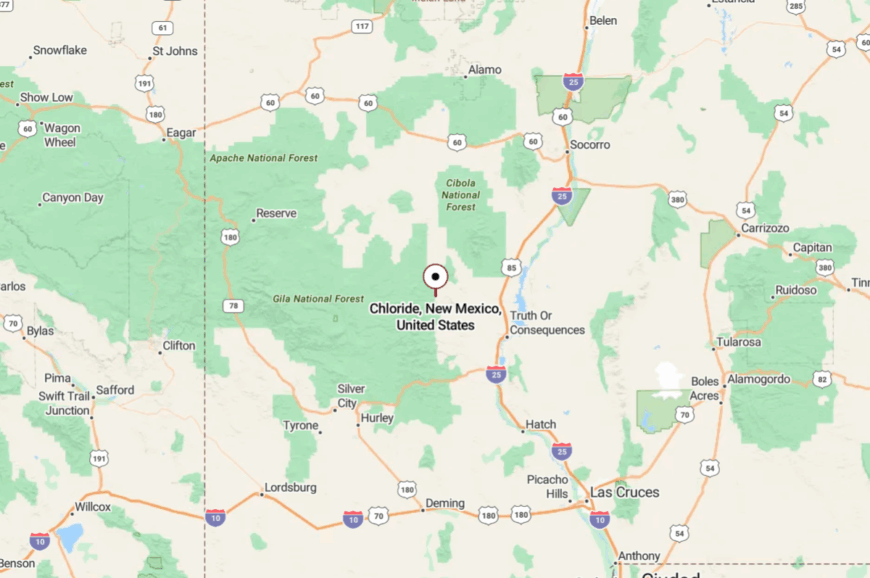
West of Winston in Sierra County, Chloride sits at the end of NM-52’s side spur into the Black Range foothills. The approach narrows as the canyon closes, and traffic fades to a memory. You’ll find few signs and fewer distractions.
It’s close enough to reach, but far enough to feel like you’ve left everything behind.
10. Cliff – Where River Valleys Embrace Solitude
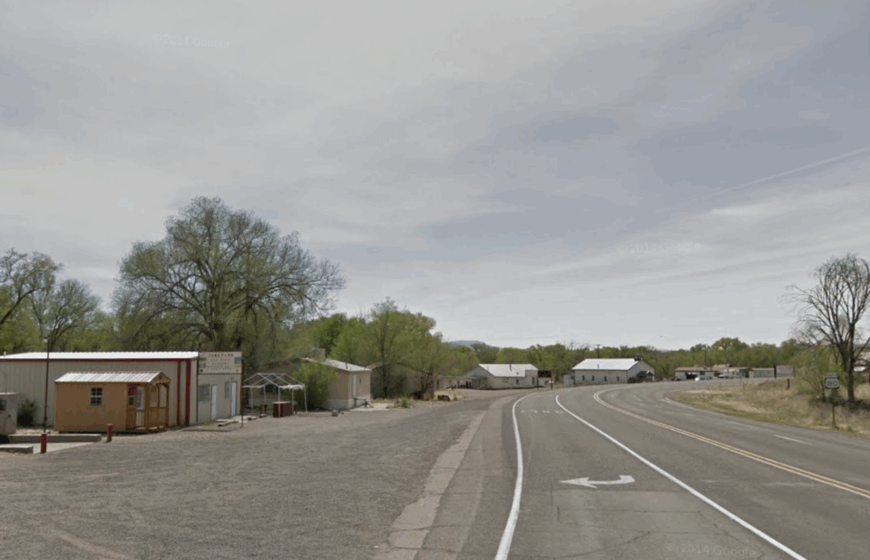
Cliff is a small community with an approximate population of just over 200 people, tucked away in the picturesque Gila River Valley. I’ve found that the area is perfect for outdoor enthusiasts, offering activities like hiking, bird watching, and exploring the nearby Gila National Forest.
The local economy primarily revolves around ranching and farming, with sprawling ranchlands defining much of the landscape. What makes Cliff truly secluded is its remote location amidst expansive valleys and its distance from major urban centers.
The lack of commercialization and the unspoiled natural surroundings give the town a peaceful atmosphere that I find incredibly refreshing. Hidden gems like the remote Lower Gila Box Canyon offer unique experiences that most visitors might overlook.
Where is Cliff?
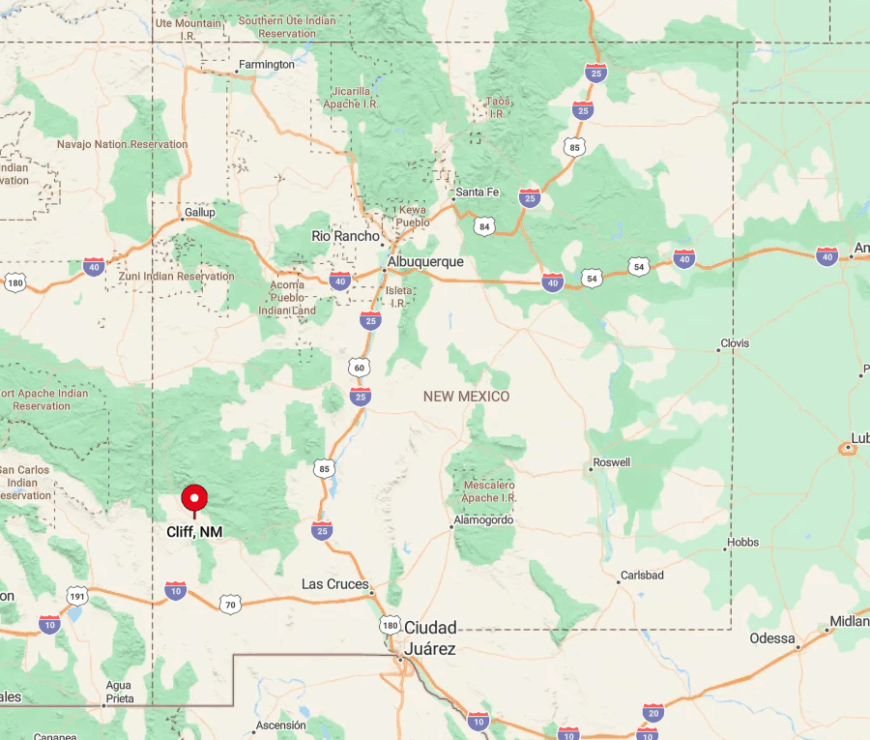
Cliff is located in Grant County in southwest New Mexico, about 30 miles northwest of Silver City. Its seclusion comes from being nestled between mountain ranges and river valleys, far from the noise of highways and cities.
I’ve discovered that the best way to reach Cliff is by taking US Route 180, which winds through scenic landscapes before arriving in this tranquil community. The journey itself is part of the charm, with vast open spaces and panoramic views that signal you’re entering a place where time slows down.
9. Buckhorn – A Quiet Hamlet Amid Forested Hills
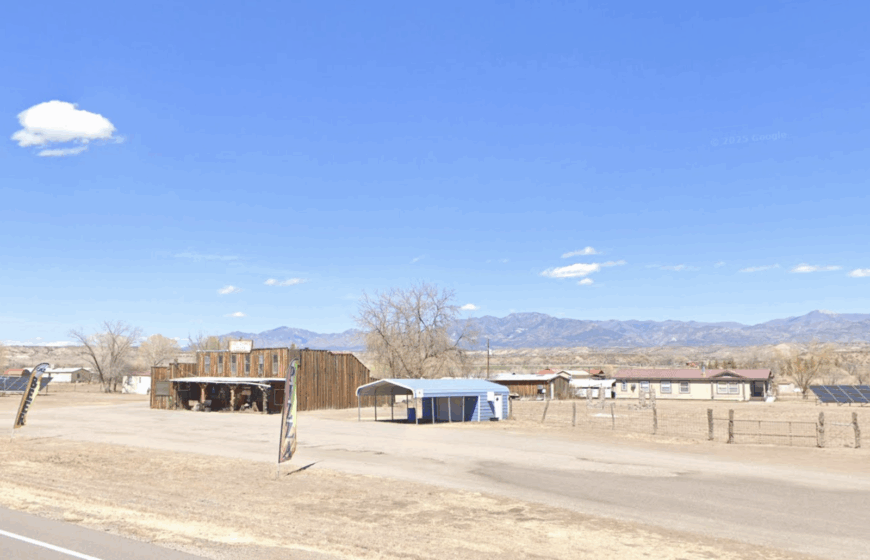
Buckhorn is a tiny unincorporated community with a population of around 150 residents, offering a serene rural lifestyle. I’ve enjoyed exploring the surrounding forested hills and the nearby Gila National Forest, which present ample opportunities for hiking, camping, and wildlife viewing.
The town doesn’t have a significant industrial base, but local businesses and ranching support the small community. Buckhorn’s seclusion is due to its remote setting amidst rugged terrain and its minimal development, which preserves the area’s natural beauty.
What I love about Buckhorn is that it’s the kind of place where everyone knows each other, and the simplicity of life is a welcome escape from the modern world. Hidden watering holes along the San Francisco River are local secrets that provide peaceful spots to relax.
Where is Buckhorn?
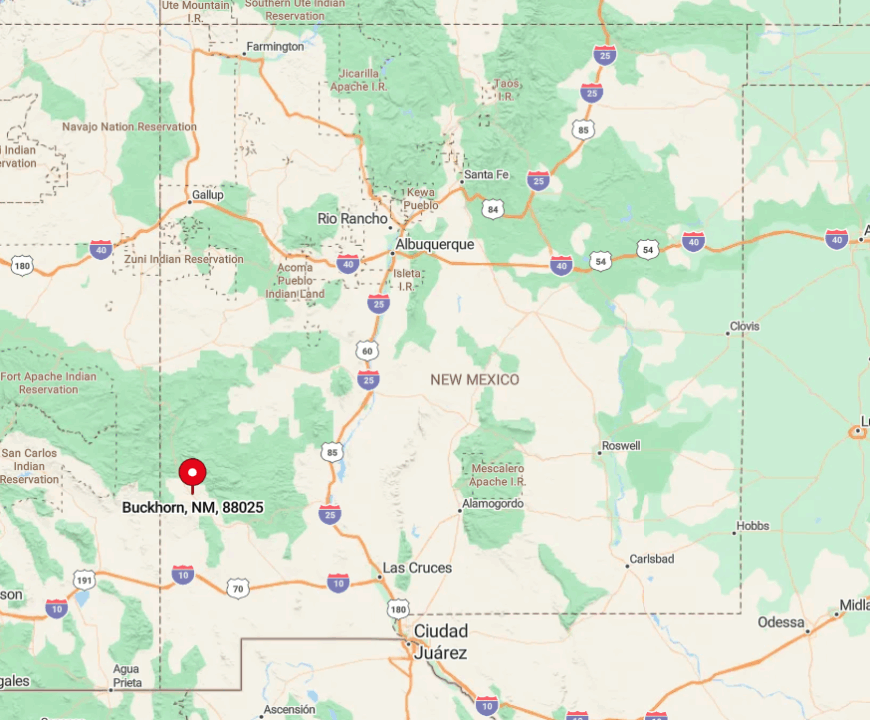
Located in Grant County, Buckhorn sits along US Route 180, about 40 miles northwest of Silver City. Its secluded nature stems from its location on the edge of vast wilderness areas, with few neighboring towns and miles of open country.
Getting to Buckhorn involves a scenic drive through rolling hills and forests, which I find adds to the sense of adventure. The town’s isolation is enhanced by its distance from major highways and urban centers, making it a perfect retreat for those seeking solitude.
8. Mule Creek – Rustic Living on the Edge of Wilderness
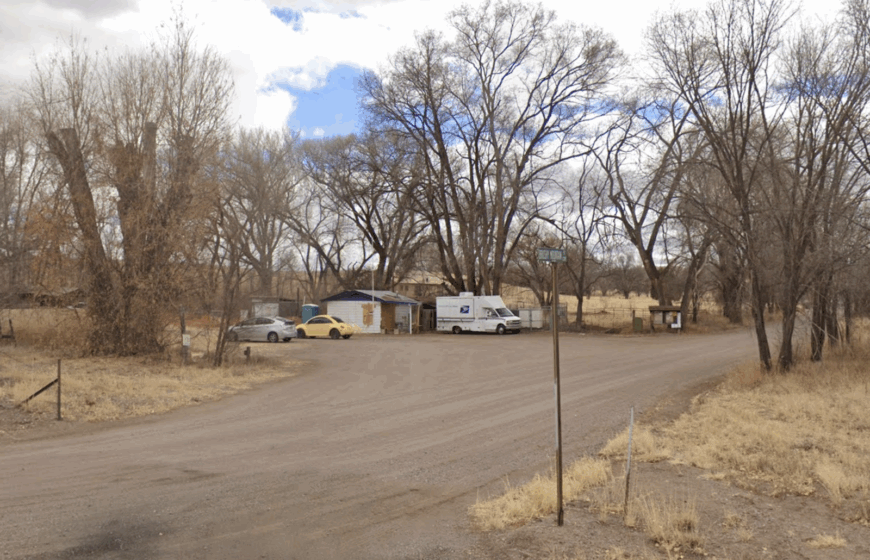
Mule Creek is a sparsely populated area with fewer than 100 residents, offering an authentic taste of rustic living. I appreciate the proximity to the Gila Wilderness, one of the largest federally protected wilderness areas in the country, providing endless opportunities for hiking, horseback riding, and backcountry exploration.
The main industries here are ranching and small-scale agriculture, reflecting a lifestyle that’s closely tied to the land. Mule Creek’s seclusion is highlighted by its vast open spaces and the absence of commercial development.
To me, the quietness is almost tangible, and the starry night skies are truly mesmerizing. An interesting hidden gem is the remote Pueblo Park Campground, a perfect spot for a quiet retreat.
Where is Mule Creek?

Situated in the far western corner of Grant County, Mule Creek is near the Arizona border, far removed from bustling towns. The area’s remoteness is due to its location at the end of State Road 78, with limited through traffic and few neighbors.
The drive to Mule Creek involves navigating winding mountain roads, which I find adds to the sense of adventure. The isolation is perfect for those looking to disconnect and immerse themselves in nature.
7. Rodeo – Where Sky Islands Meet the Desert

Rodeo is a small town with a population of around 100 people, nestled at the foothills of the Chiricahua Mountains. I’ve found that this unique location offers stunning panoramic views where the “sky islands” of the mountains rise above the desert floor.
The area is a haven for birdwatchers and astronomers, with the nearby Chiricahua Desert Museum and several observatories. There isn’t much in the way of industry; the community primarily consists of artists, retirees, and those seeking a peaceful lifestyle.
Rodeo’s seclusion comes from its remote desert location and the vast stretches of open land surrounding it. The quietude and dark skies make it an ideal spot for stargazing, which is one of my favorite activities here.
A true hidden gem is the nearby Painted Pony Resort, offering secluded accommodations amid breathtaking scenery.
Where is Rodeo?
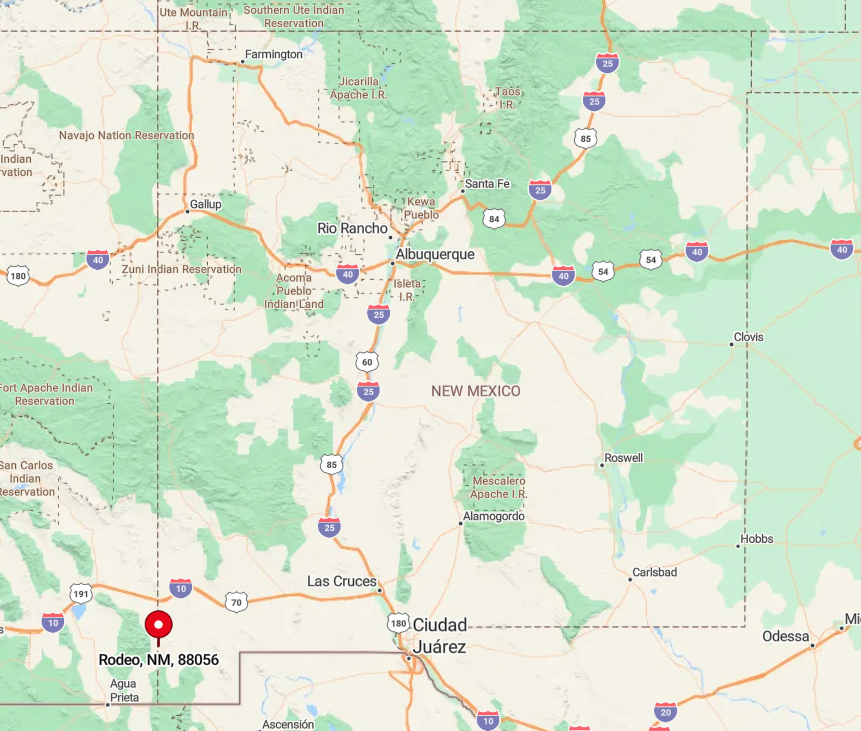
Rodeo is located in Hidalgo County, right on the border with Arizona, at the intersection of State Highway 80 and State Highway 533. Its remote setting is accentuated by the surrounding desert and mountain ranges, with the nearest larger towns quite a distance away.
Reaching Rodeo involves a drive through expansive desert landscapes, reinforcing its sense of isolation. I’ve discovered that the journey here feels like stepping into another world, far removed from the hustle and bustle of city life.
6. Hachita – Desert Solitude Under Vast Skies
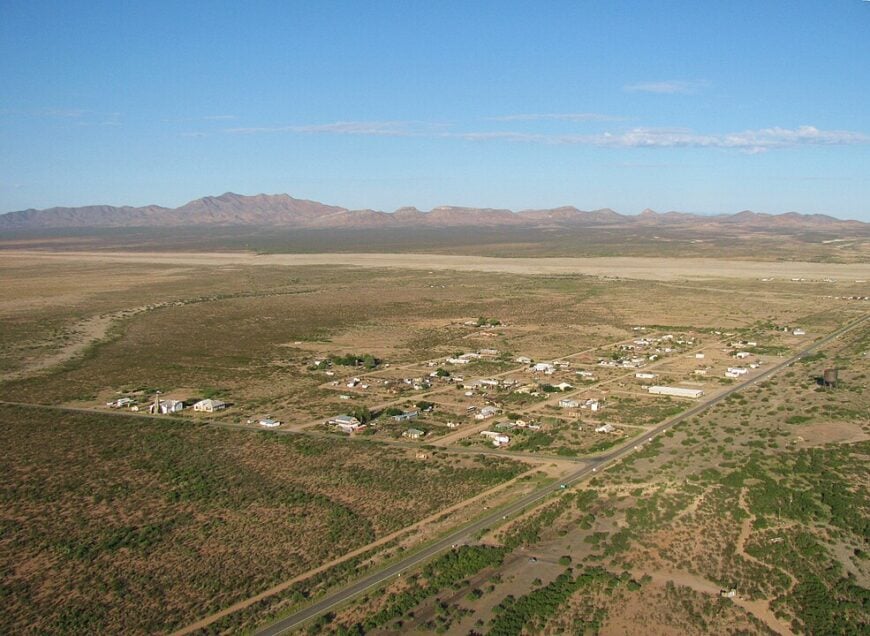
Hachita is a ghost town with a current population of fewer than 50 people, embodying true desert solitude. The town offers a glimpse into New Mexico’s mining history, with old structures and remnants of its past scattered throughout the area.
While there aren’t traditional attractions, I find the desolate beauty of the desert and the historical aspects fascinating to explore. The main industries have faded away, leaving Hachita as a quiet, almost forgotten place.
Its seclusion is profound, surrounded by miles of desert and under expansive skies that make you feel like you’re in another world. One hidden gem is the nearby Continental Divide Trail, which offers challenging hikes for the adventurous spirit.
Where is Hachita?
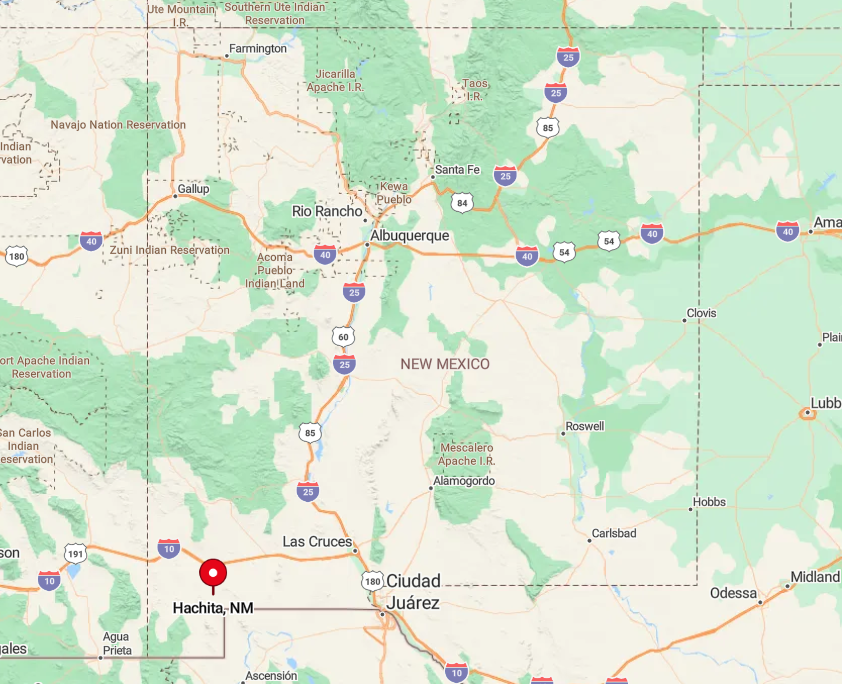
Hachita lies in far southern Hidalgo County, anchored in the wide Chihuahuan Desert along State Highway 9. It sits roughly 45 miles west of Columbus and nearly as close to the Mexican border, surrounded by open rangeland and desert basins that make the town feel like a true outpost.
Getting there means driving long, empty stretches of two-lane blacktop where traffic is rare and horizons are endless. The approach itself is part of the seclusion—big skies, sparse landmarks, and a silence that stretches as far as the road ahead.
5. Kingston – The Quiet Side of the Black Range

Kingston is a small community with a population of around 30, offering a peaceful retreat in the Black Range Mountains. The town has a rich mining history, and I enjoy exploring the historic buildings and sites that still stand today.
Outdoor activities abound, with nearby trails perfect for hiking, mountain biking, and horseback riding. There isn’t much industry left, but the town’s historic charm and natural beauty make it special.
Its seclusion is provided by the surrounding mountains and forests, which create a serene atmosphere far from crowded tourist spots. A hidden treasure is the Percha Creek that runs through town, offering a tranquil spot for picnicking and relaxation.
Where is Kingston?
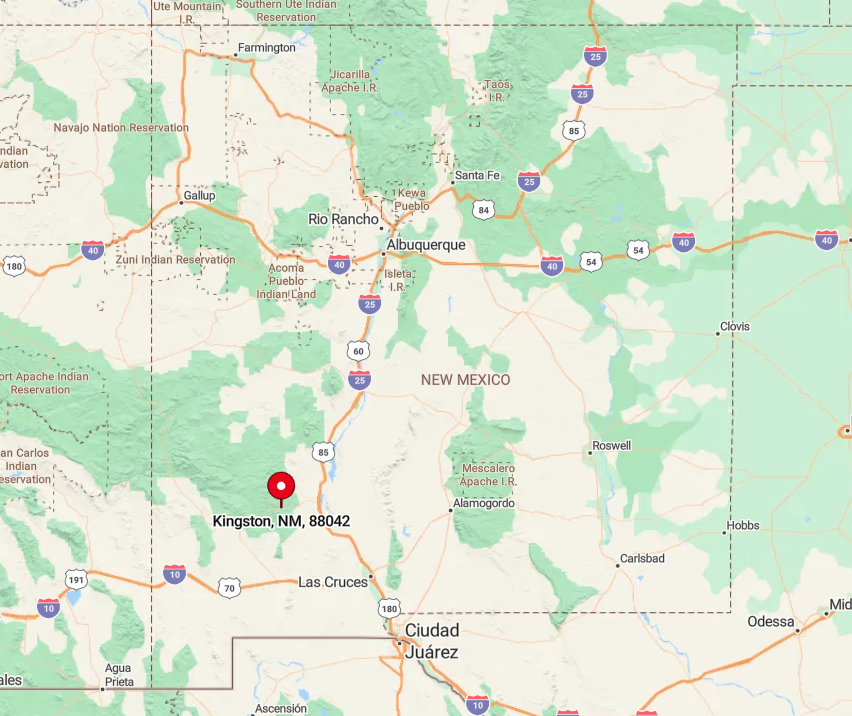
Kingston is located in Sierra County along State Highway 152, nestled in the foothills of the Black Range. The town’s remoteness is due to the winding mountain roads that lead to it, making it less accessible than other destinations.
I find that the journey through the scenic Emory Pass is well worth it, offering stunning vistas along the way. The isolation of Kingston is perfect for those who want to step back in time and enjoy the quiet side of mountain living.
4. Hillsboro – Step Back into Historic Serenity
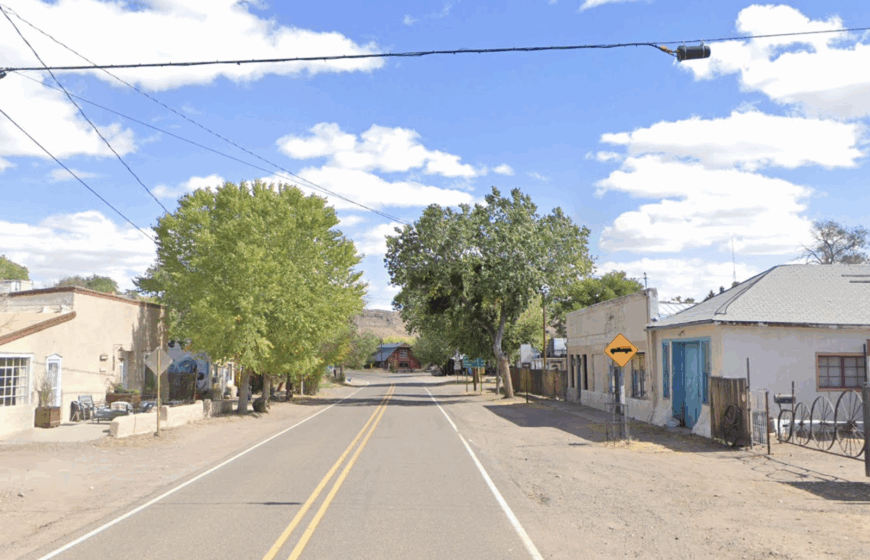
Hillsboro is a quaint town with a population of about 120, inviting visitors to experience its rich history and serene ambiance. I love wandering through the historic district, where well-preserved buildings tell tales of the town’s mining boom in the late 1800s.
The town offers charming cafés, art galleries, and antique shops that add to its small-town appeal. While mining is no longer the mainstay, tourism and local crafts support the community.
Hillsboro’s secluded nature is due to its location amidst the Black Range Mountains, away from major highways and cities. The peaceful streets and friendly locals make it a perfect place to unwind. Don’t miss the Hillsboro Historical Society Museum, a hidden gem showcasing the town’s storied past.
Where is Hillsboro?
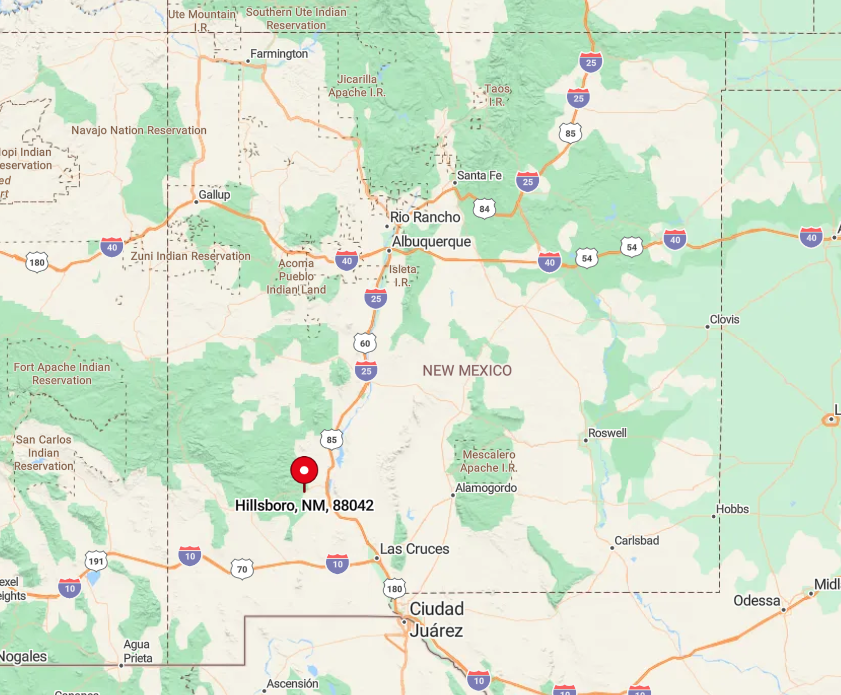
Hillsboro is situated in Sierra County along State Highway 152, about 30 miles west of Truth or Consequences. Its seclusion comes from its mountainous surroundings and the lack of nearby urban centers.
Reaching Hillsboro involves traversing winding roads that cut through scenic landscapes, which I find adds to the charm of visiting. The town’s location provides a quiet retreat while still being accessible enough for a peaceful weekend getaway.
3. Mimbres – Valleys, Vistas, and Vast Open Spaces

Mimbres is a community of around 600 residents, set in a valley with breathtaking vistas of the surrounding mountains. I enjoy the tranquil atmosphere here, where one can explore the Mimbres River and nearby archaeological sites that offer insights into the ancient Mimbres culture.
Agriculture plays a significant role in the local economy, with small farms and orchards dotting the landscape. Mimbres’ seclusion is due to its location off the beaten path, with a landscape that offers expansive views and a sense of openness.
The peaceful environment is perfect for artists, writers, and anyone seeking inspiration from nature. A hidden spot I love is the San Lorenzo Canyon, a lesser-known area ideal for hiking and photography.
Where is Mimbres?
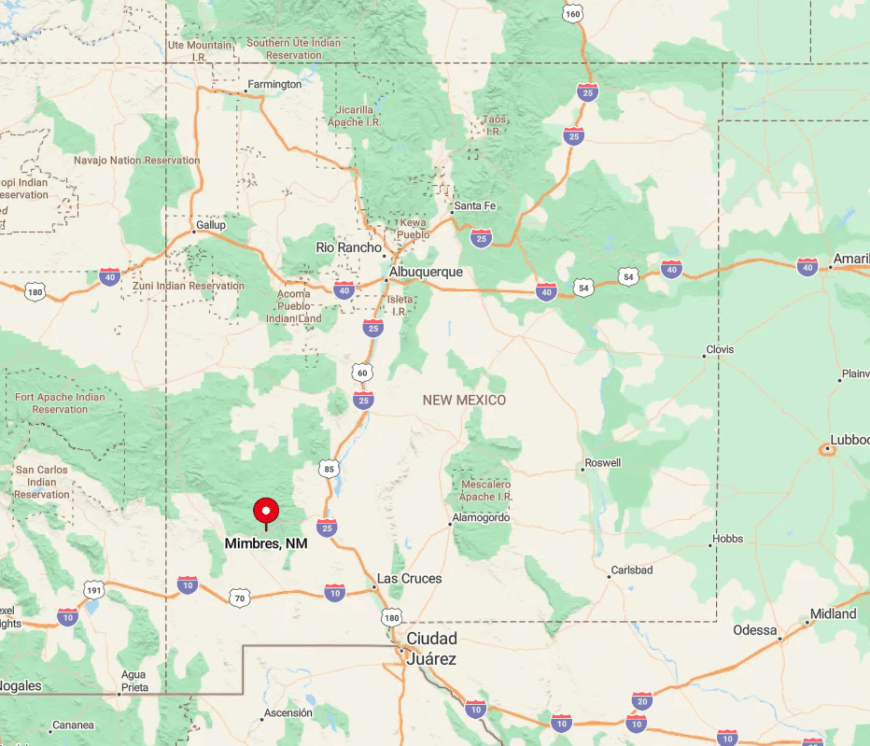
Mimbres rests in Grant County, tucked east of Silver City along NM-35. The town is set in a long valley bordered by the Gila National Forest, with the Mimbres River winding through fields and cottonwoods that have supported farming for generations.
The road into Mimbres climbs gently through foothills and past old homesteads before opening to broad views of the Black Range. Nearby landmarks like Lake Roberts and the Gila Cliff Dwellings make the valley a quiet gateway to wilderness, where the journey feels as restorative as the destination.
2. Glenwood – Gateway to the Gila Wilderness
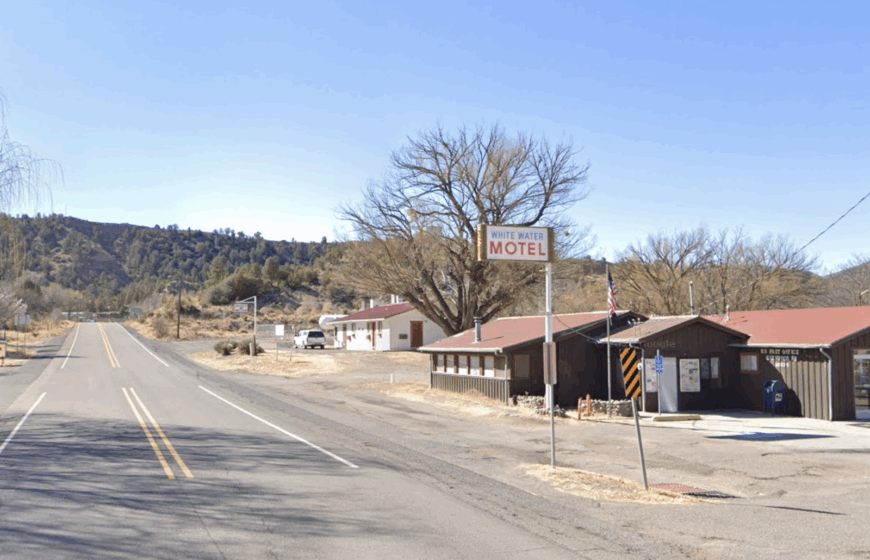
Glenwood is a small town with a population of approximately 200, serving as a gateway to the Gila Wilderness. I appreciate the abundance of outdoor activities here, including hiking to the famous Catwalk National Recreation Trail, which offers a unique walkway suspended above Whitewater Canyon.
The local economy is centered around tourism, small businesses, and ranching. Glenwood’s seclusion is provided by its location surrounded by mountains and forests, far from the hustle of larger towns.
The peaceful ambiance and natural beauty make it a haven for nature lovers like me. An off-the-beaten-path gem is the Mogollon Ghost Town nearby, which provides a glimpse into the area’s mining history.
Where is Glenwood?
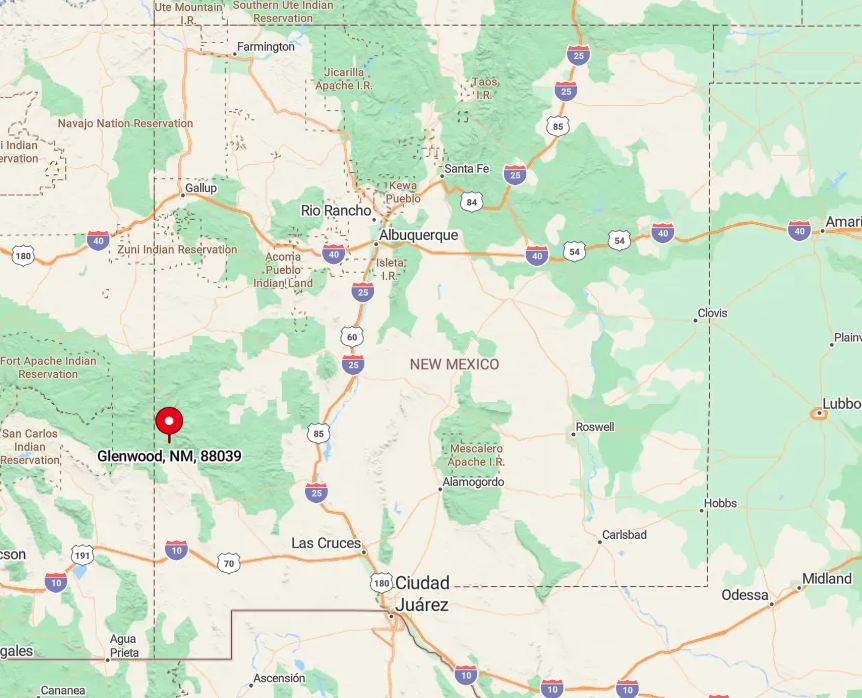
Glenwood is located in Catron County along US Route 180, about 65 miles northwest of Silver City. Its remote setting is accentuated by the surrounding Gila National Forest and the lack of major highways leading directly to it.
The drive to Glenwood takes you through stunning landscapes, which I always find rejuvenating. The town’s location provides easy access to wilderness areas while maintaining a quiet, secluded atmosphere.
1. Gila – A Riverside Haven Amidst Rolling Hills
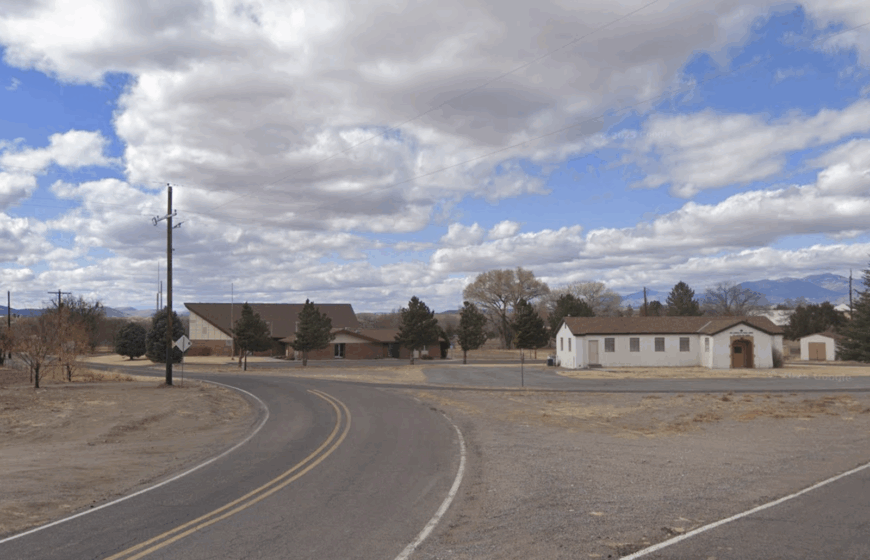
Gila is a charming community with around 300 residents, nestled along the banks of the Gila River. I’ve found that the town offers a peaceful escape, with opportunities for fishing, kayaking, and enjoying the lush surroundings created by the river.
The area is primarily agricultural, with farms and ranches benefiting from the fertile river valley. Gila’s seclusion comes from its remote location amidst rolling hills and its small population, creating a tight-knit community feel.
The combination of river landscapes and open skies provides a serene environment that I find perfect for relaxation. A hidden treasure here is the Gila Cliff Dwellings National Monument, offering a fascinating peek into ancient indigenous cultures.
Where is Gila?
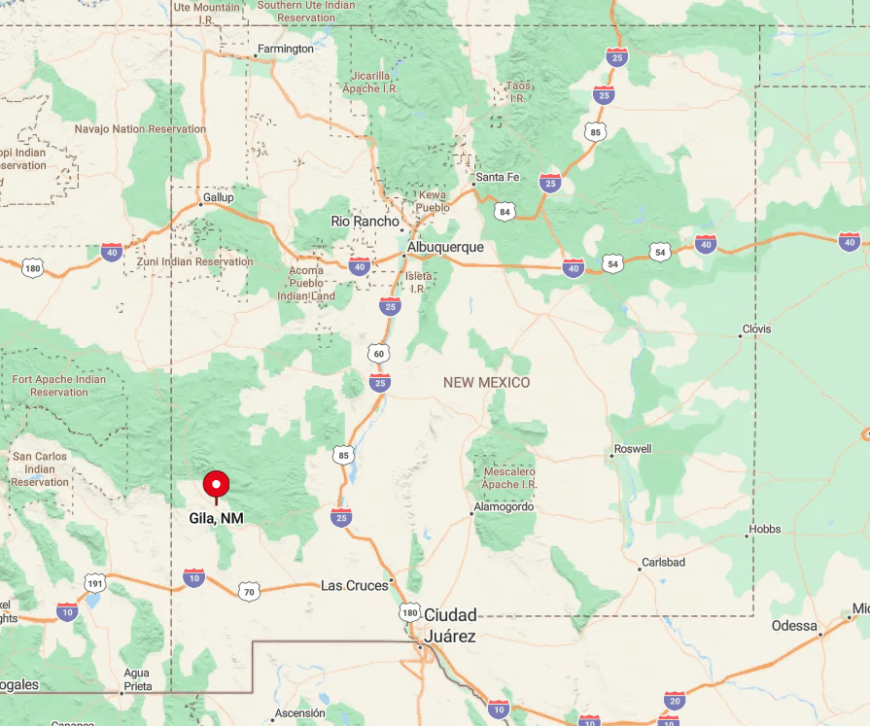
Located in Grant County, Gila lies about 30 miles northwest of Silver City, accessible via State Highway 211. Its secluded nature is due to its position away from major transportation routes and surrounded by natural features.
The journey to Gila involves driving through scenic valleys and hills, which I always find to be a peaceful experience. The town’s isolation along the Gila River makes it an ideal spot for those looking to immerse themselves in nature’s tranquility.

